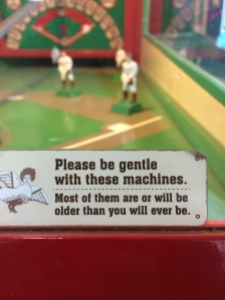I am a grammar Nazi, and there is not a more polite way to say that. Actually, maybe grammar snob is a more polite way to say that. Whatever, that’s what I am.
Yet, as an English assistant in a French school, I can cut non-native speakers all kinds of slack. I don’t care if my students say “I have fifteen years.” I don’t care if I hear “He is my sister.” It doesn’t matter. I know what they mean, and they are trying to remember a thousand different words that sound like nonsensical sounds. I know this because I in turn butcher French in fantastic and confusing ways every day of my life.
But if you are a native speaker of English, you have no excuses on this one. I read this on Facebook from someone who should know better. I’s. I’s is not a word. It even looks wrong when I write it. I’s I’s I’s I’s I’s. No. Bad touch. I saw it in the context of “My mom’s and I’s vacation was so much fun!” or something similar.
I’s is a word-ish-blech-thing that should never never ever cross your lips. It’s so slithery and sharp sounding, like a slithery and sharp thing. My simile brain is apparently on hiatus today. The root of my dislike for I’s is that it sounds icky, it’s horribly incorrect, and it needs to stop. Please?

Do this instead:
If you are a native speaker of English, you get to ignore my convoluted and probably boring explanation below and listen with your ears.
All you need to know is how to split apart the two subjects of the sentence and say them individually with the rest of the sentence. Subject 1: My mom’s. Subject 2: I’s
My mom’s vacation was so much fun. Yay! It’s perfect!
I’s vacation was so much fun. Ew. Nope. Never ever.
I have never heard anyone say or write that second sentence with only one subject. Hooray for native speaker intuition! What would you say instead? My. My vacation. My mom’s and my vacation. Easy peasy. For native speakers of English, anyway.
If that’s not you, don’t worry. There is a convoluted explanation below.
Convoluted explanation of pronouns that doesn’t even make sense to me depending on how tired I am:
Pronouns take the place of nouns. This is what happens with no pronouns: “Julia is going to stop at the store to pick up a baseball bat with which to beat incorrect grammar users. Would Julia’s mother whom Julia is addressing like for Julia to get anything for Julia’s mother?” In short, without pronouns, everything goes all to hell. I got confused just writing that.
With pronouns, however, I can say, “I am going to the store to pick up a baseball bat with which to beat incorrect grammar users. Would you like me to get anything, Mom?” Much better, if still troubling because of the implied violence.

They’re the words like I, she, he, it. Those little ones no one ever pays attention to.
And in English, we have handy dandy possessive pronouns, like “my” and “your” and “his” and “hers” and “their.” And that’s what goes here, in the vacation sentence.
My mom’s vacation + my vacation = my mom’s and my vacation.
Beautiful.
I really hope there are no grammatical errors here.
